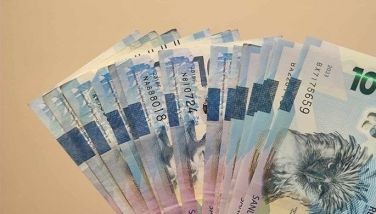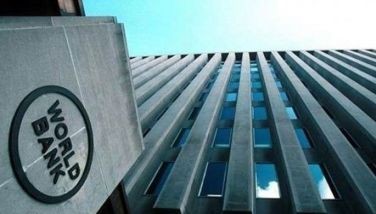Peso recovers against greenback
February 11, 2003 | 12:00am
The peso recovered against the dollar yesterday in the wake of a stern warning from the Bangko Sentral ng Pilipinas (BSP) that banks would be sanctioned if they were caught creating an artificial demand for the greenback.
At the Philippine Dealing System (PDS), the peso gained six centavos to close at its intra day high of 53.880 from Friday’s close of 53.940 to $1. Total volume traded amounted to only $79 million.
Yesterday marked the first time the peso gained ground against the dollar after nearly breaching the psychological barrier of 54 Peso recovers, to the dollar for two days in a row last week.
Sources said dollar demand eased yesterday as banks may have relented under the threat of possible BSP sanctions.
The BSP has sent out its examiners to conduct an audit of all currency traders and their day-to-day sales, warning that there will be hell to pay if they were caught hoarding dollars.
"The central bank’s moral suasion was enough to bring currency traders back to their senses," a trader from a foreign bank said.
The BSP had warned banks earlier that they would be publicly named if found violating central bank rules. "The BSP may adopt a name-and-shame policy if that is what it takes to preempt excessive speculation," the BP said.
The BSP re-issued two circulars last week requiring full documentary support for sales of foreign exchange, adding that examiners would be looking into the foreign exchange trading activity of banks.
The BSP said it could not detect any other explanation for the sudden surge in the demand for dollars, especially since trading has been markedly thin in the previous two weeks.
The BSP examiners were last sent out in July and August 2002 when the peso tumbled against the dollar due to heavy speculation.
Meanwhile, the BSP ruled out the possibility of adjusting its monetary policy in reaction to the fluctuations in the peso-dollar exchange rate, saying that inflation targeting would remain as its primary policy framework.
Banks have been speculating that the peso fluctuations would soon compel the BSP to either adjust its policy rates or move its reserve requirement and tiering policy.
BSP Deputy Governor Armando Tetangco, however, said the central bank had no plans of touching any of its monetary tools unless the impact of recent fluctuations in the foreign exchange rates actually begins to affect inflation rates.
"Banks get scared of their own shadows," Tetangco said. "At this point, there is no discussion of anything they are nervous about and inflation targeting remains our policy framework."
At the Philippine Dealing System (PDS), the peso gained six centavos to close at its intra day high of 53.880 from Friday’s close of 53.940 to $1. Total volume traded amounted to only $79 million.
Yesterday marked the first time the peso gained ground against the dollar after nearly breaching the psychological barrier of 54 Peso recovers, to the dollar for two days in a row last week.
Sources said dollar demand eased yesterday as banks may have relented under the threat of possible BSP sanctions.
The BSP has sent out its examiners to conduct an audit of all currency traders and their day-to-day sales, warning that there will be hell to pay if they were caught hoarding dollars.
"The central bank’s moral suasion was enough to bring currency traders back to their senses," a trader from a foreign bank said.
The BSP had warned banks earlier that they would be publicly named if found violating central bank rules. "The BSP may adopt a name-and-shame policy if that is what it takes to preempt excessive speculation," the BP said.
The BSP re-issued two circulars last week requiring full documentary support for sales of foreign exchange, adding that examiners would be looking into the foreign exchange trading activity of banks.
The BSP said it could not detect any other explanation for the sudden surge in the demand for dollars, especially since trading has been markedly thin in the previous two weeks.
The BSP examiners were last sent out in July and August 2002 when the peso tumbled against the dollar due to heavy speculation.
Meanwhile, the BSP ruled out the possibility of adjusting its monetary policy in reaction to the fluctuations in the peso-dollar exchange rate, saying that inflation targeting would remain as its primary policy framework.
Banks have been speculating that the peso fluctuations would soon compel the BSP to either adjust its policy rates or move its reserve requirement and tiering policy.
BSP Deputy Governor Armando Tetangco, however, said the central bank had no plans of touching any of its monetary tools unless the impact of recent fluctuations in the foreign exchange rates actually begins to affect inflation rates.
"Banks get scared of their own shadows," Tetangco said. "At this point, there is no discussion of anything they are nervous about and inflation targeting remains our policy framework."
BrandSpace Articles
<
>
- Latest
- Trending
Trending
Latest























